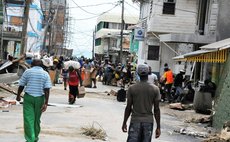PART II: Exploiting our HUGE Water Resource
Dominica currently exports VERY LIITLE water because this is limited to BOTTLED WATER. We will never be able to compete with this type of water product since almost every other Caribbean country is in the same business with a much larger local (and visitor market) so they have the advantage of economies of scale. To rebuild this potential BETTER for Dominica's future we need to start thinking of a shipping approach using water tankers (like for oil) to ship in BULK. That would eliminate for Dominica the huge PACKAGING costs (plastic bottles, labels, cartons, etc, which all have to be imported) and make bottled water shipping to other Caribbean islands simply uncompetitive
I would point out ANOTHER marketing advantage with specialized bulk carriers. These could also be used to deliver similar bulk supplies (as an alternative to another visionary idea: an underwater pipeline…but later for that…) to the French Islands, St Maarten and Barbados which receive significantly more cruise ship visits than Dominica. Storage tanks in these islands could receive the bulk water shipments to later supply cruise ships at their convenience. It is a doable project albeit an ambitious one. Keeping in mind the increasing demand and value of quality drinking water, post-Erika GRANT funding from the UN Development Program (UNDP) and the E.U. (& CARICOM itself) should be pursued. The project is the type of new millennium thinking that small islands need to pro-actively pursue for a genuinely sustainable future. All towards REBUILDING DOMINICA BETTER.
And if government prefers to look at a richer (so more reliable) water market than within the Caribbean, we could start by discussing with Australia (a fellow Commonwealth country) on the possibilities of shipping Dominica's quality drinking water to that country You quickly ask, Isn't it too far to be feasible? Wouldn't the freight costs alone be prohibitive? And doesn't Australia have desalination plants that can address their drinking water needs? Well, consider this: on the evidence of a visit to that country about 10 years ago, I personally witnessed their citizens (and their media's) often expressed disgust with the taste of much of their drinking water! There were also notable – and clearly enforced – restrictions on water usage (down to the required use of "half-toilets" !!!), and rigid rules to help stem their rapidly drying-up RIVERS. From periodic reports in the news, the overall water supply situ in Australia has, not surprisingly, got worse!
Admittedly, a dire need for a supply does not mean any supplier from anywhere is automatically suitable and a viable proposition. But what's stopping a GRANT-FUNDED feasibility study (rich countries LOVE to fund consultants, especially their own) on what could be a significant project to help a SMALL developing country become more self-reliant and sustainable? I hope the powers-that-be see the value in some sort of response to this initial proposal as we really try to improve on the past.


